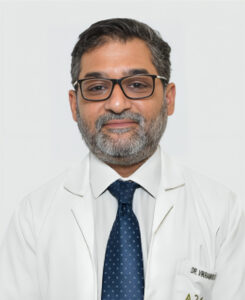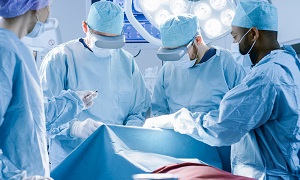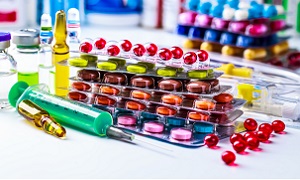Best Doctors in India for Male Breast Cancer Treatment
- Gastroenterology, Medanta - The Medicity, New Delhi, India
- 40+ Years Experience
- Medanta-The Medicity, Gurgaon
Profile Highlights:
- Dr. Randhir Sud is a preeminent figure in the field of gastroenterology, renowned for his groundbreaking contributions to gastrointestinal endoscopy and therapeutic interventions.
- As the Chairman of the Gastroenterology department at Medanta in Gurugram, Dr. Sud has played a pivotal role in advancing the field of gastroenterology in India.
- Dr. Sud is credited with revolutionizing the practice of gastrointestinal endoscopy in India. He has been instrumental in establishing and integrating advanced GI endoscopic therapy into clinical practice through extensive training programs and live workshops.
- Urologist & Kidney Transplant Surgeon
- 20+ Years Experience
- Artemis Hospital, Gurgaon
Profile Highlights:
- Dr. Vikram Barua Kaushik is a highly experienced urologist with a specialized focus on organ transplantation and advanced urological procedures.
- He currently serves as the Chief of Urology, overseeing the Kidney Transplant Program and Robotic Surgery (Unit II) at Artemis Hospital in Gurugram, New Delhi.
- His clinical focus includes urinary stone disease, cancers of the genitourinary tract, prostatic disease, urinary incontinence, and neurogenic bladder dysfunction.
- Lung Transplant and Thoracic Surgery
- Over 36 years
- Medanta-The Medicity, Gurgaon
Profile Highlights:
- Dr. Arvind Kumar is a highly accomplished Thoracic Surgeon with over 36 years of experience in the field.
- He is recognized as one of India’s leading experts in the surgical treatment of chest-related diseases, particularly in Minimally Invasive and Robotic Surgery techniques.
- Currently serving as the Chairman of Lung Transplant and Thoracic Surgery at Medanta, Gurugram, he leads the hospital’s pioneering Chest Surgery Program.
Best Hospitals in India for Male Breast Cancer Treatment
What is Breast Cancer in Males?
Breast cancer can also develop in males, but the chances of occurrence are very rare. In men, cancer develops in the small amount of breast tissue present behind the nipples.
Signs & symptoms of Breast Cancer in Males
The common signs & symptoms associated with breast cancer male are:
- Lump in one of the breasts, which is almost always painless. Gynaecomastia, a non-cancerous condition where male breast tissue becomes enlarged, leads to the formation of lumps.
- Nipple retraction, the nipple begins to turn in on itself.
- Nipple ulceration, the nipple becomes hard, sore & there is swelling of the nipple.
- Fluid discharge from the nipple.
If the cancer spreads to other parts of the body, the associated symptoms are:
- Pain in the bones.
- Swelling of the lymph nodes
- Loss of appetite & nausea
- Jaundice
Causes & risk factors of Breast Cancer in Males
The exact cause of breast cancer in males is not clear, but a number of factors increases the risk of developing breast cancer in males, which are:
- Age- The risk of developing breast cancer in males increases with age. It occurs mostly in men aged 60-70 years.
- Family history- Having family history of breast cancer increases the risk of developing breast cancer in men.
- Genetic mutations & a rare genetic condition, Klinefelter syndrome in which males produce less testosterone than usual are associated in developing breast cancer in men.
- Increased level of hormone, oestrogen, also increases the risk of developing breast cancer.
- Occupational factors- It is believed that men who work in hot environments are more likely to develop breast cancer.
- Exposure to radiation increases the chance of developing breast cancer in men.
Diagnosis of Male Breast Cancer
Physical Examination
In physical examination, the doctors checks for lump in the breasts & swelling in the lymph nodes.
Mammogram
Mammogram is a type of X-ray that helps to determine any changes in the breast that can lead to cancer.
Ultrasound
An image of the inside of breasts is produced by using high-frequency sound waves.
Biopsy
A tissue from suspected area is removed & send to the lab for the presence of cancerous cells.
Treatment options for Male Breast Cancer
Depending on the Stage & Grade of Cancer, the treatment plan is decided. Following are the treatment options for Male Breast Cancer.
Surgery
Chemotherapy
Chemotherapy is the use of anti-cancer drug that helps to slow or stop the growth of rapidly dividing cells that cause cancer. It prevents the growth of rapidly dividing cells by killing the dividing cells.
Despite its side effects, chemo is still the most widely used cancer treatment option. Unlike radiation and surgery which treats cancer cells at particular locations, chemotherapy drugs can kill cancer cells that have metastated (spread) to different organs in the body.
Radiation Therapy
Radiation Therapy is a kind of cancer treatment that uses high doses of radiation beams to kill cancer cells to shrink the tumors. Radiation kills the cancer cells by destroying the DNA. Cancer cells with damaged DNA fail to multiply and die. They are then removed by the body’s mechanism.
Hormone Therapy
Hormones of our body are produced in the endocrine glands like thyroid, pancreas, ovaries & testes. Some hormones may help growth of cancers like breast & prostate cancer. In hormone therapy, medications are given to deprive the cancer cells of the hormones they need to grow. In some cases, the specific gland responsible for hormone may be surgically removed.







